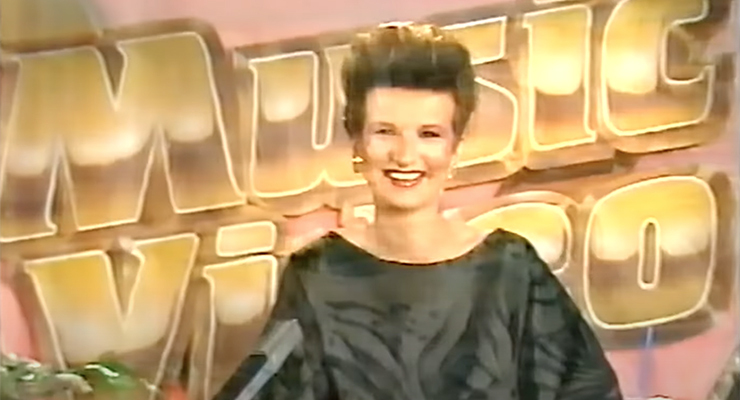
The only way to honour the departed is to be brutally honest, and so I must tell readers that for a short time in the early 1980s Basia Bonkowski, who died recently, was my girlfriend.
She was not aware of this, we never met, and I suspect my competition was many, many thousands of other awkward, bookish, culture-ish teenage boys and an unknown number of girls.
When in 1981 she popped up on TV in the new rock music show of the new ethnic network SBS 0-28, with her post-punky UFO haircut, her smoky eye and angular Polski looks, and her distracted, unfussy manner (“The next song is … The next song is …”), it was, across suburban living rooms all over the land, love at first sight.
Rock Around the World, the show she presented, came out of the glorious early spirit of SBS, which was that no one had any idea what they were doing as they got it started. The network featured broadcasts from church halls of kids in smocks dancing to fat-bottomed string instruments played by old men, the combined Balkan soccer riots on the weekend, and European movies with sex in them called things like Summer of the Unripe Avocados.
Amid this, Rock Around the World was given a mission to play music videos from all around the world, i.e. Europe. It threw everything in it could get its hands on in those sparse days, from cute vids like Trio’s “Da Da Da“, to Blondie appearing on French TV, to Hunters and Collectors’ “Talking To a Stranger” (from their film school period when putting a rubber band across your face was a statement, and before they got taken up by Carey prefects doing commerce/law) to scratched ’70s film of Golden Earring doing “Radar Love”. And, of course, “Shivers”.
Over it all presided Basia, neophyte presenter, short-film actor with the permanent, mildly startled air of the semi-amateur and a Gioconda smile.
She later described herself as an enthusiast rather than an expert, and that was her manner throughout as one wacky pseudo-intellectual video after another landed: amused, but not contemptuous, not drawn into presenter style, just someone sitting in a tub chair in a studio introducing video clips.
The whole culture was simpler, more ad hoc then. Presenting a TV music show was not much above running a Christian youth club on a wet Saturday afternoon in Deepdene.
Limited channels, Triple R, and RAM magazine kept you informed, as did untapeable, had-to-be-home-to-commandeer-the-one-TV-set Rock Around the World. Basia was an avatar that told you there was a world out there you were seeking, somewhere between the Black Cat Cafe, the Seaview Ballroom, Pellegrini’s and Missing Link Records.
Girls who carried round copies of Camus’ L’Etranger and accessorised at ISHKA started copying her straight-up Frankenstein hair, handknit sweaters and flared cuffs, so I’m guessing she was some sort of inspiration there too.
How do I know I was not alone in such fascination? Painters & Dockers wrote a whole song about her (“Bas-IAH!”) for the same reason I’m writing this: they had to get her out of their heads. There was nothing grossly sexual in it, for me anyway (the bank was already bursting its vaults, even by then).
She was the pure possibility that there were wonderful things out there, waiting for you. When decades later, as a TV producer, I called her to see about a panel show appearance, and she answered her own phone, I really simply lost it and had to call back. It was a category error, like being put in touch with the Girl from Ipanema. Which I guess, in the empyrean of pop culture, is simply grace.
She had a good career after that, as presenter and producer, wrote two books of life memoir, took the married name of Rendall, and died from a return of the lymphoma she’d first got at 17, and which had propelled her to be something more than the drama teacher she had trained to be, and whose manner she never entirely discarded, and how strange life is, that out of such awful symmetries come the thousand small things that make it all worthwhile.
Peace to her family in their loss; they share her with a time and a place, and the many people who are still there, waiting for the next song.








Crikey is committed to hosting lively discussions. Help us keep the conversation useful, interesting and welcoming. We aim to publish comments quickly in the interest of promoting robust conversation, but we’re a small team and we deploy filters to protect against legal risk. Occasionally your comment may be held up while we review, but we’re working as fast as we can to keep the conversation rolling.
The Crikey comment section is members-only content. Please subscribe to leave a comment.
The Crikey comment section is members-only content. Please login to leave a comment.